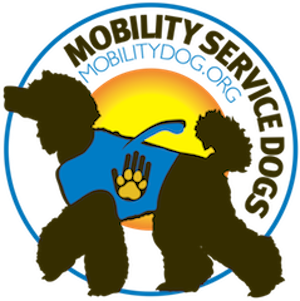🐾 Save the Date!
Mobility Access Service Dog Evaluation Workshop
Coming August 2025
Are you ready to explore how a mobility service dog could support your independence, balance, and daily life?
MobilityDog.org is excited to announce our upcoming Service Dog Evaluation Workshop, taking place in August 2025. This empowering event is designed for adults and seniors with mobility challenges who want to learn whether their dog has what it takes to be mobility service dog.
At MobilityDog, service mobility dog assessments are essential for both the person and the dog. These evaluations determine whether an individual is physically and emotionally prepared for a service dog partnership, and whether a specific dog has the right temperament, health, and trainability for mobility work. It’s a two-sided process that ensures safety, compatibility, and long-term success. For humans, the assessment explores daily routines, mobility limitations, and readiness to participate in training. For dogs, it’s about identifying calm, confident, and responsive candidates who can perform reliably in both public and private settings.
Key Qualities of a Service Dog Candidate
To determine if a dog is suitable for mobility service work, several assessments are conducted. A temperament assessment checks the dog’s response to strangers, animals, loud sounds, and novel environments—looking for a calm, stable demeanor. The ideal dog is friendly but not overly enthusiastic, able to ignore distractions, and remain focused in busy environments like shopping malls or medical offices. Trainability is equally important: dogs must be eager to learn, responsive to commands like “sit” or “leave it,” and able to maintain concentration on their handler even in distracting settings.
Strength & Size
Ideal mobility service dog candidates are typically large enough—usually weighing over 50 pounds—to provide stability or bracing support. They must be physically strong, free from joint issues or other conditions that could limit their ability to perform tasks.
A dog’s physical health is critical in ensuring they can carry out tasks such as stabilizing a handler, opening doors, or retrieving objects. Dogs in training must be free of conditions that would impair performance, and while most begin as puppies, age alone doesn’t disqualify a capable dog. Socialization plays a major role—service dogs must be well-adjusted to different people, animals, and environments from an early age. Non-aggressiveness and composure under stress are non-negotiable traits.
Next Steps with MobilityDog
After a successful human and canine assessment, MobilityDog guides participants through the next stages of the service dog process. Individuals may be invited to training workshops and matched with a specially selected hypoallergenic poodle or doodle. Throughout, the program provides professional guidance, building a strong and trusting bond between the dog and their handler. By carefully assessing both people and dogs, MobilityDog ensures each team is equipped to work together effectively—empowering people with mobility disabilities to live more independent, connected, and fulfilling lives.
🗓️ What to Expect:
Learn if you dog can be trained to help with balance, stability, retrieving items, and navigating public spaces.
Connect with trainers, and accessibility experts.
Participate in evaluations to assess individual needs, environments, and lifestyle fit.
📍 Location and exact date to be announced soon – but mark your calendar for August!
🎟️ Space will be limited, so early registration is strongly encouraged.Join the MobilityDog community in discovering the power of partnership between humans and service dogs.
👉 Stay tuned for updates and registration info at MobilityDog.org when we will have dates, locations and applications.

